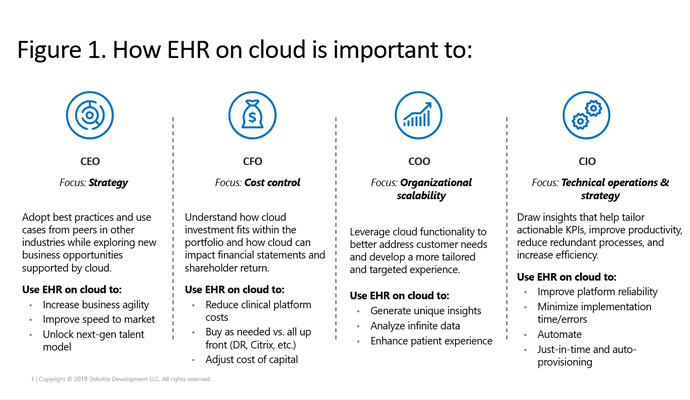How Cloud EHR Reduces Operating Costs, Increases Computing Power
Cloud EHR technology has the potential to reduce operational costs while increasing computational potential.
If every cloud has a silver lining, then cloud EHR’s should be looking quite bright to healthcare organizations seeking an alternative to owning and operating an on-premise electronic health record (EHR) system infrastructure.
Many hospitals and health systems today are struggling with the escalating cost and complexity of keeping their on-premise EHR infrastructure functionally up to date, at sufficient capacity, and in compliance with evolving regulations. Among common issues:
- Data volumes continue to grow. It is generally accepted that well-protected organizations maintain 12 copies of their production EHR data, so each 1TB of growth equals 12TB of capacity.
- Production compute capacity for multiple purposes (EHR, VDI or cloud) is typically sized at 50 percent over peak production demand, with a requirement for equally sized disaster recovery environments.
- All computing environments (production, test, disaster recovery, et al) typically need to be completely resized and refreshed every three years. Major events such as mergers or acquisitions can require resizing and refreshing in even less time.
- Accelerating release cycles will require automated release processes to prevent overloading of the EHR application technical support staff.
Two areas that healthcare executives tend to focus on when they consider moving their EHR to a cloud provider’s environment are total cost of ownership (TCO) and technical validation. Cloud EHR can deliver on both, offering cost savings and scalable, secure computing capacity.
Cloud computing, network, and storage services are elastic, on-demand, and geo-redundant. Organizations pay for what they need when they need it — without a capital expenditure investment or long lead times. These cost savings can be quite attractive because many organizations generally need a system refresh in three-to-five years.
From a technical standpoint, storing their EHR data in a scalable cloud environment offers considerable advantages.
First, capacity concerns generally become a non-issue because cloud EHR can quickly scale to accommodate growing data volumes while eliminating the technical debt of existing infrastructure.
Second, subscribing organizations can access cloud-hosted features and applications that provide additional flexibility and mobility. For example, in the future, cloud-enabled artificial intelligence and machine learning applications could provide physicians with a “superhuman” research partner available 24 hours a day, 365 days a year.
Finally, cloud EHR solutions typically include automation tools and methodologies as well as managed services that enable process and environment optimization which, when combined with cloud’s cost and technology advantages, can satisfy requirements across the C-suite (figure 1):

We have identified significant organizational benefits to standing up an EHR on cloud versus on premise. For one client, we estimated TCO for an on-premise EHR solution at $11 million for infrastructure over five years, with 16 weeks to develop the infrastructure and stand up environments. In contrast, we estimated TCO for a cloud EHR at $3.2 million over five years, with just one week to develop stand up environments.
Migrating from a hosted to cloud EHR doesn’t have to be an all-or-nothing proposition. Organizations rightfully concerned with safeguarding their data “crown jewels” may opt for a phased transition, starting with a small pilot environment and progressing to non-production, to disaster recovery, to production environments.
Among suggested steps forward are evaluating the value (TCO) of an on-premise versus EHR on cloud migration; validating technology stack consideration; planning environment migration; evaluating supporting technologies; planning and executing the migration strategy; stabilizing period coverage; and addressing long-term operational considerations.
__________________________________________________
Contact
Eric Foote
Managing Director–Health Care Cloud Engineering
Deloitte Consulting LLP
313-657-1799
[email protected]
Michael Montalto
Consulting Managing Director
Deloitte Consulting LLP
732-778-5861
[email protected]





